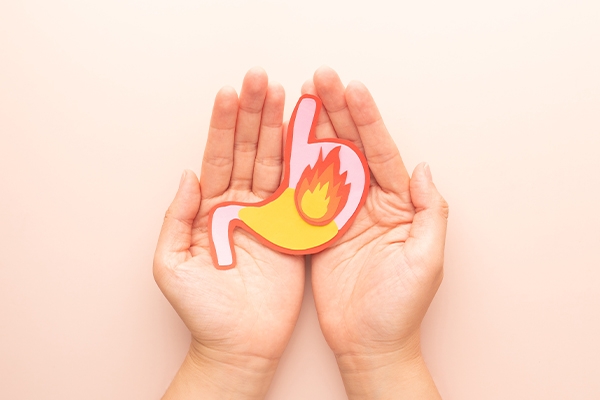Stress Can Trigger Acid Reflux? Recognize GERD Symptoms and Find Solutions with Stomach Infusion Therapy

Many people don’t realize that stress not only affects the mind, but also digestion.
When you’re chasing deadlines or facing work pressure, the body releases stress hormones that can increase stomach acid production. As a result, GERD (Gastroesophageal Reflux Disease) symptoms can easily flare up.
A 2023 study in Sri Lanka found that people living with moderate to high stress levels were nearly twice as likely to experience acid reflux symptoms compared to those with low stress levels.
What is GERD?

GERD is a condition where stomach acid flows back into the esophagus, causing discomfort. Occasional acid reflux is considered normal, but frequent recurrence may be diagnosed as GERD.
This condition occurs when the valve-like mechanism that should tightly close the passage between the stomach and esophagus doesn’t function properly. As a result, acid rises and irritates the esophagus.
Common symptoms of GERD include a burning sensation in the chest (heartburn), along with a sour or bitter taste in the mouth.
Some people may also experience nausea, bloating, and difficulty swallowing. In certain cases, GERD can cause chronic cough, hoarseness, or persistent sore throat.
The link between stress and GERD

Emotional stress can worsen GERD symptoms because it:
1. Increases stomach acid production
Stress can alter how the stomach produces acid. High stress levels may trigger excess acid, increasing the likelihood of reflux.
2. Disrupts the function of the lower esophageal sphincter
This muscle works like a valve—opening to let food enter the stomach and closing to keep stomach contents down. Stress can interfere with its function, making it easier for acid to flow upward.
3. Heightens sensitivity to symptoms
Stressed individuals often become more aware of bodily sensations, which may make GERD symptoms feel more intense.
4. Leads to behavioral changes
Stress may trigger habits that worsen GERD, such as:
- eating too quickly or overeating,
- skipping meals or eating late at night,
- consuming more caffeine or alcohol,
- having poor sleep quality.
That’s why many people notice their acid reflux flares up during periods of heavy stress.
Stress affects the nervous system and the gut-brain connection, disrupting digestive function. While stress doesn’t directly cause reflux, it can increase the frequency and severity of GERD symptoms.
How to reduce GERD symptoms
Managing stress and living a healthy lifestyle are key to controlling GERD. Some steps you can take include:
- Eat regular, smaller meals.
- Avoid trigger foods such as coffee, soda, spicy food, and fatty meals.
- Don’t lie down immediately after eating.
- Practice relaxation, light exercise, or meditation to manage stress.
- Avoid smoking and alcohol.
What to do during an acid reflux flare-up?

If your acid reflux suddenly worsens, try these tips:
1. Stay upright and avoid lying down
Remaining upright is one of the fastest ways to ease symptoms, as gravity helps prevent acid from moving up into the esophagus. Avoid lying down or bending over right after a flare-up or a meal.
2. Sip water or milk (not too much)
Taking small sips of water can help push acid back down into the stomach. Some people find that a small glass of milk soothes the esophagus and neutralizes acid—but be cautious, as milk may trigger reflux in certain individuals.
3. Loosen belts or wear comfortable clothing
Tight clothing, especially around the waist, can increase abdominal pressure and worsen reflux. Loose clothing can help ease discomfort.
4. Adjust eating habits
Eat smaller, more frequent meals instead of large, heavy ones. Chew food slowly and thoroughly to reduce the risk of reflux. Also, avoid trigger foods and drinks such as spicy meals, alcohol, chocolate, fatty foods, or fast food.
5. Practice deep breathing and relaxation
Since stress worsens reflux, practicing slow deep breathing or relaxation techniques during an episode can ease anxiety and relieve symptoms.
6. Take antacids
Antacids can quickly neutralize stomach acid and provide relief. Take them as directed and consult a healthcare provider if symptoms persist.
Do you need stomach infusion therapy?
In some cases, lifestyle changes alone may not be enough. If GERD symptoms frequently return despite healthy eating habits and stress management, it’s best to seek medical help.
One solution to consider is stomach infusion therapy. This treatment works directly in the body, providing faster recovery compared to oral medication.
The formula is tailored to each patient’s needs, helping improve digestion and absorption more effectively. With this therapy, symptoms can ease more quickly, hospitalization risks are reduced, and treatment feels far more comfortable.
If you are struggling with acid reflux, visit GWS Medika Clinic in Jakarta for stomach infusion therapy.



